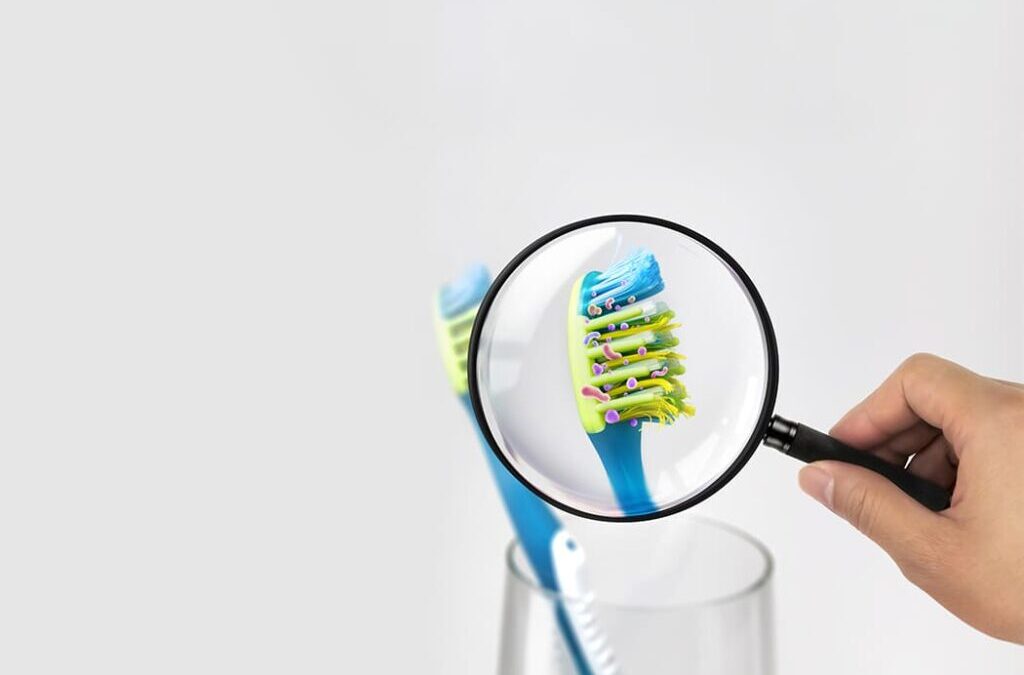Do you know what’s lurking on your toothbrush?
Your toothbrush is loaded with germs. Researchers have found that one uncovered toothbrush can harbor more than 100 million bacteria, including E. coli bacteria, which can cause diarrhea, and staphylococci (“Staph”) bacteria that cause skin infections.
But don’t panic. Your mouth wasn’t exactly sterile to begin with.There are hundreds of microorganisms in our mouths every day.That’s no big deal. Problems only start when there is an unhealthy balance of bacteria in the mouth.It’s important to remember that plaque — the stuff you’re removing from your teeth — is bacteria.So you’re putting bacteria on your toothbrush every time you brush your teeth.
Regardless of how many bacteria live in your mouth, or have gotten in there via your toothbrush, your body’s natural defenses make it highly unlikely that you’re going to catch an infection simply from brushing your teeth
It’s something else that really makes you sick.
You may get periodontal disease from your family, partner or pet.
Sharing toothbrushes or cups can pass along periodontal disease and that parents should never share these items with their children. You may thought that sharing or borrowing a toothbrush is probably harmless, especially if you rinse the brush off first. In reality, though, you shouldn’t share your toothbrush or ever let anyone else use your brush.
As you may know, everyone has different bacteria in their mouth. Toothbrushes can actually harbor bad bacteria, and if you share a toothbrush, you could be sharing bad bacteria. The bacteria that cause cavities are also contagious, so sharing a brush can actually leave you more vulnerable to cavities. Many toothbrushes can also harbor blood, since many individuals bleed when they brush or floss. If you use a brush with someone else’s blood on it, you could find yourself with diseases like herpes, hepatitis, and HPV. Sharing saliva can also leave you more vulnerable to yeast infections and to pneumonia.
A “kiss” on the mouth from a pet can pass along the bacteria that cause gum disease.You can pass along the oral bacteria responsible for gum disease from human to human as well as from animal to human. And it goes both ways – you can also give your pet gum disease if you have the bacteria and he doesn’t!
Toothbrush bristles Can cause appendicitis.
It sounds a little crazy,but it’s true! swallowing your toothbrush bristles can trigger appendicitis. A good way to prevent this is to make sure you are changing your toothbrush or brush head every three months, or sooner if the bristles are becoming loose or bent.
What Happens if You Brush Too Hard?
You are serious about protecting oral hygiene. You may diligently use a mouthwash, floss once a day, and brush twice a day. You certainly deserve commendation for your good habits! However, there are cases in which individuals have become too enthusiastic about oral hygiene; they may apply too much pressure when they brush their teeth. Here to explain how overaggressive brushing can harm your smile .
Brushing your teeth too hard can have two devastating consequences for your oral health:
Premature wear and tear. Tooth enamel is very hard — in fact, it is the hardest substance in the human body. However, it can get worn away by overaggressive brushing. Applying too much pressure may slowly erode your enamel, which cannot repair itself once it suffers significant damage. You may experience increased dental sensitivity and a heightened risk of cavities.
Gum recession. Brushing too hard can cause the gum tissue to shrink back. Not only will this affect the way your smile looks, but if the recession progresses far enough, the roots of your teeth may become exposed. Tooth roots are much more sensitive to outside stimuli and may be more prone to decay than the top portion of teeth because they have no enamel to protect them.
Keep your brush as germ-free as possible
Most bathrooms are small. And in many homes, the toilet is pretty close to the bathroom sink where you keep your toothbrush.
Every toilet flush sends a spray of bacteria into the air. And you don’t want the toilet spray anywhere near your open toothbrush.
You don’t store your plates and glasses by the toilet, so why would you want to place your toothbrush there? It’s just common sense to store your toothbrush as far away from the toilet as possible.
And if you’ve been sick…
Change your toothbrush altogether! The germs that cause you to fall ill can still remain on your toothbrush after you’ve started to feel better! If you don’t properly dispose of your toothbrush you used while sick, re-infection can occur. Your immune system is just now starting to feel better, which means it is also vulnerable. Help protect your mouth and your body by always replacing your toothbrush after feeling sick!

